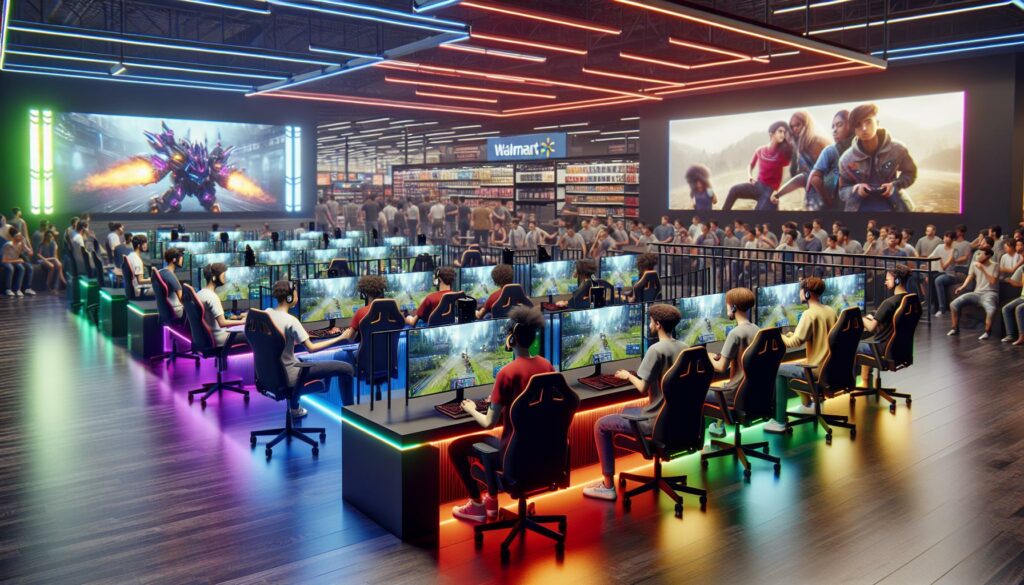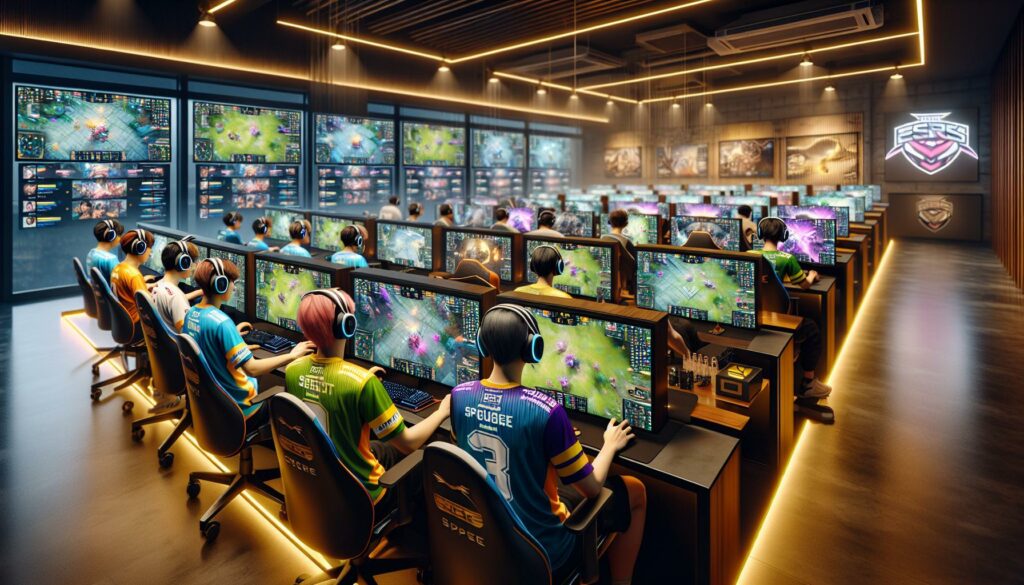As a gaming enthusiast and college advisor, I’ve watched competitive gaming transform from a niche hobby into a full-fledged collegiate sport. The rise of esports programs in universities across America has created exciting new opportunities for students who dream of turning their gaming passion into a career. I’m amazed by how quickly colleges have embraced esports teams, with hundreds of institutions now offering scholarships and dedicated gaming facilities. These programs aren’t just about playing games – they’re comprehensive educational experiences that combine competitive gaming with business management, marketing, and broadcasting skills. Whether you’re interested in League of Legends, Overwatch, or Rocket League, there’s likely a collegiate program that fits your gaming interests.
- Collegiate esports has grown exponentially, expanding from 7 varsity teams in 2016 to over 175 programs in 2023, with major titles like League of Legends, Overwatch, and Rocket League leading the competition.
- Top universities like UC Irvine, Robert Morris, and Ohio State offer comprehensive esports programs with state-of-the-art facilities, multiple competitive teams, and substantial scholarship opportunities ranging from $500 to $35,000 annually.
- Esports scholarships now match traditional athletic programs, with options including merit-based awards, athletic scholarships covering 25-100% of tuition, and hybrid academic-gaming opportunities.
- Professional training facilities feature high-end gaming equipment, dedicated coaching staff, and comprehensive support services including mental performance coaches, nutritionists, and technical support teams.
- College esports programs provide diverse career pathways beyond competitive gaming, including opportunities in tournament operations, content creation, marketing, broadcasting, and team management, with strong industry connections and internship programs.
Colleges With Esports Teams
Collegiate esports programs have expanded from 7 varsity teams in 2016 to over 175 programs in 2023. This explosive growth demonstrates the transformation of competitive gaming from a casual hobby into a legitimate collegiate athletic pursuit.
Notable Gaming Titles in College Esports
Popular collegiate esports titles align with major professional leagues and tournaments:
- League of Legends: The most prevalent collegiate esports title with 125 varsity programs competing in Riot Games’ College Championship
- Overwatch: Features 89 collegiate teams participating in the Overwatch Collegiate Championship
- Rocket League: Includes 82 varsity programs in the College Carball Association
- Valorant: Hosts 76 collegiate teams in the VALORANT Collegiate Program
- Counter-Strike: Maintains 65 varsity rosters in the ESEA Collegiate League
| Game Title | Active College Programs | Average Scholarship Amount |
|---|---|---|
| League of Legends | 125 | $8,000 |
| Overwatch | 89 | $7,500 |
| Rocket League | 82 | $6,500 |
| Valorant | 76 | $6,000 |
| Counter-Strike | 65 | $5,500 |
Each title offers unique competitive formats:
- Semester-long regular seasons
- Single-elimination playoff brackets
- Regional qualifiers
- National championship events
- Cross-conference invitationals
These established gaming titles provide structured competition formats with clear advancement paths from collegiate to professional levels. Each game cultivates specific skill sets ranging from strategic team coordination to individual mechanical expertise.
Top Universities With Competitive Esports Teams
Several prestigious universities have established dominant esports programs with state-of-the-art facilities, competitive teams across multiple titles and comprehensive support systems for student-athletes.
Division I Esports Powerhouses
- University of California Irvine fields teams in 8 competitive titles with a 3,500-square-foot UCI Esports Arena containing 72 gaming stations
- Robert Morris University offers $4 million in annual scholarships across 6 esports titles including League of Legends, Overwatch 2 and Rocket League
- The Ohio State University maintains a 5,000-square-foot dedicated esports facility with broadcast capabilities and research labs
- Miami University (OH) features varsity teams in 5 games supported by the Armstrong Student Center gaming space and performance coaching staff
| University | Number of Teams | Annual Scholarship Pool | Facility Size (sq ft) |
|---|---|---|---|
| UC Irvine | 8 | $1.2M | 3,500 |
| Robert Morris | 6 | $4M | 2,800 |
| Ohio State | 7 | $2.5M | 5,000 |
| Miami (OH) | 5 | $1.8M | 2,500 |
- Grand View University launched its program in 2019 with dedicated training facilities and full-ride scholarships for competitive players
- Harrisburg University built a $750,000 training facility and competes in 3 major titles with professional coaching staff
- St. Clair College developed a comprehensive esports curriculum alongside competitive teams in 4 gaming titles
- Full Sail University operates “”The Fortress,”” a 11,200-square-foot esports arena supporting multiple competitive teams and production capabilities
| College | Launch Year | Investment | Number of Titles |
|---|---|---|---|
| Grand View | 2019 | $500K | 5 |
| Harrisburg | 2018 | $750K | 3 |
| St. Clair | 2020 | $400K | 4 |
| Full Sail | 2019 | $6M | 6 |
Esports Scholarships and Recruitment
Collegiate esports scholarships now match traditional athletic programs in structure and value, with institutions offering both partial and full-ride opportunities. Financial aid packages range from $500-$35,000 per academic year for competitive gaming students.
Types of Gaming Scholarships Available
- Merit-based scholarships evaluate win rates, tournament placements and competitive rankings across specific game titles
- Athletic scholarships cover 25-100% of tuition costs based on player performance and program requirements
- Academic-gaming hybrid awards combine GPA requirements with competitive achievements
- Team captain scholarships provide additional funding for leadership roles in varsity esports programs
- Position-specific grants target roles like team strategists shotcallers or specialist players
| Scholarship Type | Average Annual Amount | Requirements |
|---|---|---|
| Full Athletic | $25,000 – $35,000 | Top 1% ranking, tournament wins |
| Partial Athletic | $5,000 – $15,000 | Top 10% ranking, competitive experience |
| Merit-Based | $500 – $5,000 | Varied skill requirements |
| Leadership | $2,000 – $8,000 | Captain experience, communication skills |
- Online scouting platforms track competitive rankings achievements and statistics across major titles
- Recruitment combines gameplay VOD reviews interview sessions and live tryouts
- Programs evaluate technical skills through 1-on-1 matches with current team members
- Coaches assess communication abilities through team practice scenarios
- Academic performance records factor into scholarship eligibility determinations
- Physical wellness evaluations ensure students can handle practice schedules
- Character assessments examine online behavior and tournament conduct history
- Prospective students submit highlight reels demonstrating mechanical skills team plays and decision-making
All scholarship information is sourced from the National Association of Collegiate Esports (NACE) and individual university athletic departments.
Training Facilities and Resources
Collegiate esports facilities combine advanced gaming technology with professional training environments to create optimal competitive spaces. These dedicated areas support both team practice sessions and official tournament play.
State-of-the-Art Gaming Arenas
Modern collegiate esports arenas feature professional-grade equipment including:
- High-performance gaming PCs with RTX 4090 graphics cards & 360Hz monitors
- Ergonomic gaming chairs & height-adjustable desks
- Professional broadcast equipment for streaming & content creation
- Team review rooms with interactive displays for strategy analysis
- Custom lighting & sound systems for optimal gaming conditions
Notable examples include:
| University | Arena Size | Features |
|---|---|---|
| UC Irvine | 3,500 sq ft | 72 gaming stations, spectator area |
| Ohio State | 5,000 sq ft | Broadcasting studio, wellness center |
| Full Sail | 11,200 sq ft | 500-seat arena, production control room |
Coaching and Support Staff
Professional esports programs maintain comprehensive support teams:
- Head coaches specializing in specific game titles
- Strategic analysts for match preparation & opponent scouting
- Mental performance coaches focusing on stress management
- Physical trainers developing gaming-specific exercises
- Team nutritionists creating personalized meal plans
- Academic advisors ensuring scholastic success
- Technical support staff maintaining equipment & network infrastructure
| Service Type | Frequency | Purpose |
|---|---|---|
| Team VOD Review | 3x weekly | Strategy analysis & improvement |
| Physical Training | 2x weekly | Gaming ergonomics & injury prevention |
| Mental Coaching | 1x weekly | Performance psychology & team dynamics |
Career Opportunities Through College Esports
College esports programs connect students with diverse career pathways in the gaming industry through structured professional development programs. These opportunities extend beyond competitive play into business operations marketing technology.
Industry Connections and Internships
College esports programs partner with major gaming companies like Riot Games Intel Twitch to provide hands-on industry experience. Students gain internships in areas such as:
- Managing tournament operations for ESL Gaming’s collegiate events
- Creating content for gaming organizations like 100 Thieves Team Liquid
- Developing marketing campaigns with gaming hardware manufacturers
- Producing broadcasts for platforms like YouTube Gaming Twitch
- Analyzing player data for professional esports organizations
The internship placements offer direct pathways to full-time positions with partner companies after graduation. Many programs report 85% job placement rates for students who complete gaming industry internships.
Professional Gaming Pathways
Collegiate esports establishes clear routes to professional competition through:
- Direct recruitment from professional teams scouting college tournaments
- Development leagues operated by game publishers like Riot’s LCS Academy
- Coaching certification programs leading to positions with pro organizations
- Broadcasting opportunities with major esports production companies
- Team management roles with professional esports organizations
| Professional Role | Average Starting Salary | Job Growth Rate |
|---|---|---|
| Esports Coach | $45,000 | 25% |
| Team Manager | $52,000 | 22% |
| Content Producer | $48,000 | 18% |
| Data Analyst | $58,000 | 20% |
| Marketing Manager | $55,000 | 15% |
Collegiate esports has emerged as a game-changing force in higher education. I’ve seen firsthand how these programs are transforming traditional campus athletics and creating exciting new career paths for students passionate about gaming.
Whether you’re a competitive gamer looking to turn pro or interested in the business side of esports there’s likely a program that fits your goals. With state-of-the-art facilities comprehensive support systems and substantial scholarship opportunities the future of collegiate esports looks incredibly promising.
I believe we’ll continue to see explosive growth in this field as more universities recognize the value of esports programs. For students considering this path now’s the perfect time to jump in and become part of this thriving collegiate esports community.



